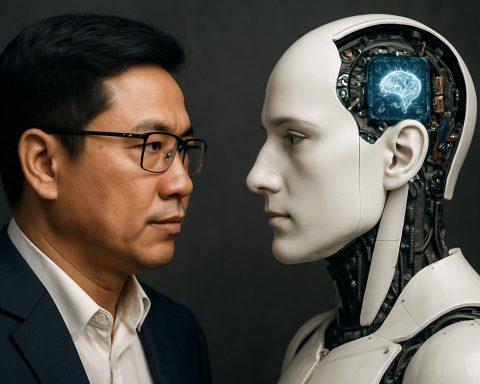The Power of Tech at Trump’s Inauguration
During the inauguration of the newly elected US President, a prominent assembly of tech billionaires made their presence felt. Esteemed figures like Jeff Bezos, Mark Zuckerberg, Tim Cook, and Sundar Pichai attended the momentous occasion, reflecting the tech industry’s influence in Washington, D.C.
Reports indicate that both Alphabet and Apple contributed substantially, each donating one million dollars to the inauguration festivities. This financial backing appears strategic, as only a day later, President Trump announced the ambitious “Stargate” AI infrastructure project. This initiative is set to invest around $500 billion in the advancement of artificial intelligence, aiming to secure the technological supremacy of the United States while creating an estimated 100,000 jobs.
Moreover, Trump swiftly overturned a previous regulation by his predecessor concerning AI, signaling a new era of innovation and investment opportunities. This shift in the political landscape is particularly enticing for investors looking to harness the potential of technology stocks.
The BOTSI-Advisor, a sophisticated investment tool designed to identify high-potential tech companies, has yielded impressive returns, outperforming the Nasdaq 100 significantly. In just one year, the BOTSI model portfolio has grown by an astonishing 66%.
For those keen to explore the technology sector further, innovative investment solutions are now more accessible than ever, allowing investors to capitalize on this technological revolution.
The Broader Implications of Tech Power in Governance
As the presence of tech giants at President Trump’s inauguration highlighted, the intersection of technology and governance is becoming a defining feature of modern society. With influential figures like Jeff Bezos and Sundar Pichai in attendance, the implications of tech involvement in politics extend far beyond mere philanthropy. This convergence raises critical questions about corporate influence over public policy and the accountability of private companies that hold increasing sway over governmental decisions.
The financial commitment from major tech players, alongside initiatives like the “Stargate” AI project, signals a paradigm shift toward a technology-centric agenda in the US. The prospective investment of $500 billion in AI is not just about economic growth; it is poised to reshape job markets, with 100,000 new positions anticipated. However, this focus on AI raises concerns about job displacement and the ethical implications of automation, highlighting the need for a balanced approach to technological advancement that prioritizes both innovation and societal well-being.
Moreover, the environmental impact of escalating tech initiatives cannot be overlooked. The demand for resources to support AI infrastructure, including data centers consuming vast amounts of energy, contributes to the global climate crisis. As the world grapples with sustainability challenges, it is vital for stakeholders to consider environmentally conscious practices in the quest for progress.
Looking forward, the intimate relationship between tech and governance suggests a future trend where public policy will increasingly reflect the interests of technology firms. This shift may create unprecedented opportunities but also necessitates robust regulations to ensure that democratic values are upheld amidst the rise of technological influence. Ultimately, how society navigates this landscape will define the long-term significance of this new era of governance intertwined with technology.
Tech Titans Rally Behind Trump’s Vision: What You Need to Know
During the inauguration of President Trump, a notable gathering of the tech industry’s elite signaled a possible shift in U.S. policies regarding technology and artificial intelligence (AI). Key players such as Jeff Bezos, Mark Zuckerberg, Tim Cook, and Sundar Pichai highlighted the growing intertwine between the tech world and political administration, suggesting that big tech may influence future governmental frameworks.
Key Financial Contributions
Reports reveal that tech giants like Alphabet and Apple made significant financial contributions to the inauguration, each donating $1 million. This investment aligns with the subsequent announcement of the ambitious “Stargate” AI infrastructure project, which is set to allocate $500 billion towards enhancing artificial intelligence capabilities in the United States. The initiative is expected not only to bolster national security but also to generate around 100,000 jobs in various sectors.
The Implications of “Stargate”
President Trump’s announcement of the Stargate project marks a substantial shift in national priorities towards technological advancement. By overturning prior regulations governing AI, Trump’s administration indicates a focus on innovation and investment, likely appealing to both domestic and international investors eager to tap into a burgeoning sector.
Investment Opportunities
The technological landscape offers diverse investment opportunities. Tools like the BOTSI-Advisor are gaining popularity among investors. This sophisticated investment platform specializes in detecting high-potential tech companies and has delivered a staggering 66% return over the past year. Such performance hints at a resilient tech sector with the potential for explosive growth.
Pros and Cons of Investing in Tech Stocks
Pros:
– High potential for significant returns, as demonstrated by successful investment tools.
– Increasing government support and funding can catalyze growth in the technology sector.
– Continuous innovation and development in AI and other technologies keep the market dynamic.
Cons:
– Volatility in tech stocks may lead to substantial risks in investment.
– Regulatory changes can pose unpredictability for the profitability of certain tech companies.
– Over-reliance on government projects (like Stargate) may skew the market’s health.
Future Trends in the Tech Industry
With the advent of initiatives like the Stargate project, we can anticipate several key trends:
– Enhanced funding for AI research and development across various industries.
– A surge in jobs linked to technology as governmental backing ramps up.
– Increased collaboration between big tech firms and government agencies, driving innovation.
Conclusion
The convergence of technology and government, exemplified by the attendance of prominent tech figures at Trump’s inauguration and the unveiling of the Stargate project, suggests a transformative era is on the horizon. For savvy investors and tech enthusiasts alike, these developments highlight the potential for unparalleled growth in the sector.
As investor interest grows, staying attuned to changes in both the tech landscape and governmental policies will be crucial for capitalizing on emerging opportunities. For more insights into investments and technologies, consider visiting Forbes for expert analysis and updates.






